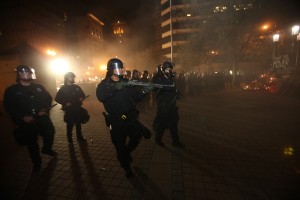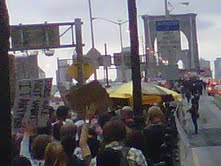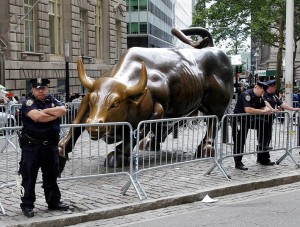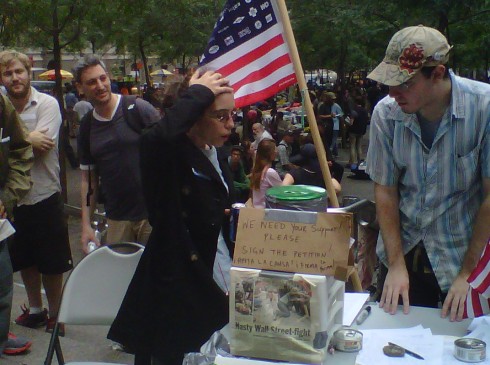“No government can exist for a single moment without the cooperation of the people, willing or forced, and if people withdraw their cooperation in every detail, the government will come to a standstill.”
–Gandhi
The Occupy movement is now a genie that cannot be put back in its bottle.
And while it has certainly gone through growing pains, and will continue to do so, the adversity faced has only forced the movement to adapt and refocus.
After their first eviction, Occupy San Francisco decided to occupy sidewalks around the downtown financial district (the original strategy for Occupy Wall Street before 17 September, I should add.) Can’t have an encampment? Adapt and take public sidewalks. There is now a nationwide movement to also throw the gauntlet at major banks like Bank of America, and re-occupy foreclosed homes for families thrown out by the financial criminal class. The move has even prompted Bank of America to fire out an email to its employees. And yes, the email’s existence has indeed been confirmed by a Bank of America representative.
The financial elite are not the only ones concerned about this nonviolent peoples’ movement, of course. Incredibly, Mayor Jean Quan stated in a recent interview that mayors from at least 18 cities have been holding conference calls with each other to discuss how to deal with the Occupy movement. There are legitimate questions as to whether federal agencies like the FBI and the Department of Homeland Security are playing some kind of advisory role or even assisting in coordinating crackdowns on occupations too. Indeed, it would be surprising if the federal government were not, given the history of programs like COINTELPRO. It is well known, however, that DHS operates what are known as fusion centers, which serve as “focal points within the state and local environment for the receipt, analysis, gathering, and sharing of threat-related information between the federal government and state, local, tribal, territorial (SLTT) and private sector partners.” Investigative journalists such as Jason Leopold are continuing to search for more answers about what role, if any, the federal government is playing in these crackdowns.
What is no mystery, however, is the contempt and cruelty often displayed by police towards this movement. Here’s what Patrick Meghan, a writer for the sitcom “Family Guy” experienced at the hands of the LAPD:
“I was arrested at about 1 a.m. Wednesday morning with 291 other people at Occupy LA. I was sitting in City Hall Park with a pillow, a blanket, and a copy of Thich Nhat Hanh’s “Being Peace” when 1,400 heavily-armed LAPD officers in paramilitary SWAT gear streamed in. I was in a group of about 50 peaceful protestors who sat Indian-style, arms interlocked, around a tent (the symbolic image of the Occupy movement). The LAPD officers encircled us, weapons drawn, while we chanted ‘We Are Peaceful’ and ‘We Are Nonviolent’ and ‘Join Us.'”
It gets worse.
“When the LAPD finally began arresting those of us interlocked around the symbolic tent, we were all ordered by the LAPD to unlink from each other (in order to facilitate the arrests). Each seated, nonviolent protester beside me who refused to cooperate by unlinking his arms had the following done to him: an LAPD officer would forcibly extend the protestor’s legs, grab his left foot, twist it all the way around and then stomp his boot on the insole, pinning the protestor’s left foot to the pavement, twisted backwards. Then the LAPD officer would grab the protestor’s right foot and twist it all the way the other direction until the non-violent protestor, in incredible agony, would shriek in pain and unlink from his neighbor. It was horrible to watch, and apparently designed to terrorize the rest of us.”
The police state will continue to use terror to coerce this movement into backing down. It will not work, however. As Andrew Kolin states in his book State Power and Democracy: Before and During The Presidency of George W. Bush: “Keep in mind that police states are by their inherent nature dysfunctional,” Kolin said. “The Occupy movement is hope of a return to mass democracy as a countervailing force to the police state and to it’s possible breakdown.” In an excellent interview with Jason Leopold at Truthout, Kolin says that “in all police states, ‘and Germany in the [1930s] is the classic example, they develop by crushing democracy.'”

Philadelphia police on a SEPTA bus arrive in riot gear to evict Occupy Philadelphia. Photo by Dustin Slaughter
Myself and over 50 others were arrested in the early-morning hours after Occupy Philadelphia’s eviction–for marching. My resolve, as well as those who were arrested or were outraged at the way the police handled the eviction, has only strengthened. This movement must use love and persistence to fight back. There is no other way. The state knows only violence and fear, and this can only continue for so long in the face of what the Occupy movement offers as an alternative. This movement must continue to struggle for what dissident playwright and later president of the Czech Republic Vaclav Havel calls “defending the everyday aims of life.”
As Mark Kurlansky writes of Havel in Nonviolence: The History of a Dangerous Idea:
“Organizations were formed to support the families of those persecuted by the government; alternative ‘universities’ taught the things excluded from official education; environmental groups were formed and cultural activities established…Increasingly citizens could live life apart from the one established by the regime. Though the actions were small, the goals were large.”
Kurlansky goes on to write of Havel’s strategy:
“…if people lived their lives parallel to the state system and not as a part of it–which he [Havel] termed “living within a lie”–there would always be a tension between these two realities and they would not be able to permanently coexist.”
The Occupy movement has for months now been engaged in creating the very same “counter-society” Havel and the Solidarity movement created to eventually bring the Soviet empire to its knees. Occupations across the country have been stepping up to offer free food, shelter and healthcare to the homeless because the state has failed to do so, a state that in turn uses its own failure as an excuse to evict peaceful protesters. The “occupation” has plans to offer free college education in Philadelphia, with local college professors volunteering their time, as I’m sure there are similar initiatives to do so in other parts of the country. And the movement is now standing–physically–with American families from across the country who are trampled on by banks who knowingly committed fraud and tossed people out of their homes.
Despite the winter, Occupy 2.0 is just getting warmed up. What are YOU going to do now?












